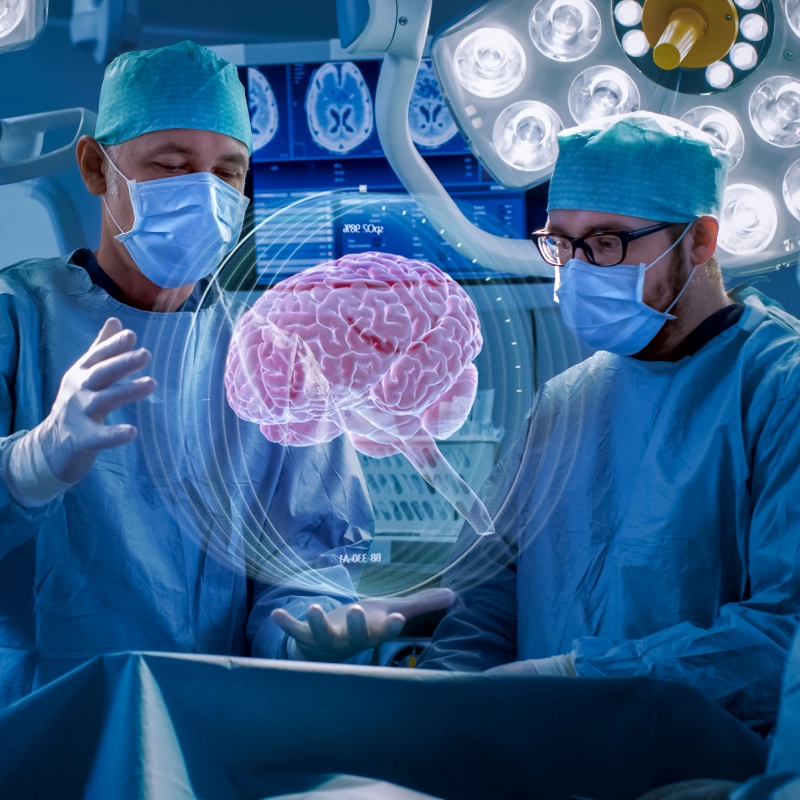Home/Wellness Zone/Sakra Blogs
1st Apr, 2024

Brain tumours are the most terrifying diagnosis one can get upon visiting the neurosurgeon for a headache, vomiting, loss of vision, weakness of the limbs, speech and memory problems or imbalance. As for most tumours, they may be benign or malignant.
In India 5-10 people per lakh are diagnosed with a brain tumour of which approximately 2% are malignant. A benign tumour is a lump which is typically slow-growing over many months or years which becomes evident only when the patient develops symptoms due to its size or a critical location affecting functions like strength in the limbs, speech, memory or balance. A cancerous/malignant tumour on the other hand is commonly a fast-growing entity which can produce symptoms due to rapidly increasing pressure on the normal brain as well as destruction of the brain tissue and resultant swelling around the tumour. However, ‘brain tumour’ need not be a fatal diagnosis in many cases in this technologically advanced day and age. At Sakra World Hospital we are breaking barriers at the forefront of science using state of the art technology to improve diagnosis and accuracy of surgical treatment, so more patients recover faster and an excellent quality of life after surgery.
As we have stepped into the 21st century there have been groundbreaking technological advances which make it easier for the surgeon to achieve complete resection of tumours while preserving vital parts of the brain which have been unaffected. These include surgical microscopes, ultrasonic suction aspirators (CUSA), navigation systems, novel intra operative imaging, electrophysiological monitoring, functional mapping, minimally invasive surgery and robotic surgery to name a few.
A surgical microscope can help magnify up to 40 times so that the surgeon can visualize the smallest structures in the brain both in 2D and 3D.They are also equipped with special lighting used with fluorescence producing dyes like fluorescein or 5-Aminilevulanic acid (5-ALA) to better distinguish the tumour from normal brain visually during microscopic surgery.
Patients with tumours in critical speech or motor areas are at risk of losing these functions and use of “awake brain surgery” to assess the speech or strength in the limbs while the surgeon is resecting the tumour is undertaken instead of keeping the patient completely unconscious.
CUSA (cavitron ultrasonic suction aspirator) is a device which used ultrasonic cutting with suction simultaneously to accurately cut through firm lesions without affecting the surrounding blood vessels and normal brain tissue faster reducing the duration of surgery.
Minimally invasive techniques like keyhole surgery, endoscopy, as well as robotic surgeries, use small openings in the skull to access even deeper areas so that there is minimal damage to the normal brain. It improves the precision, improves the surgical outcomes, reduces blood loss and reduces hospital stay.
Modern intraoperative imaging techniques like ultrasound, CT and MRI help to locate the lesion as well as confirm the adequate removal after the procedure. It helps the surgeon to resect as much of the tumour safely as possible. Navigation systems are like GPS for brain used to locate the lesion accurately before surgery to guide the neurosurgeon and reduce the size of the incision and duration of surgery. It provides a real time information about the 3D spatial location of the lesion and surrounding important structures of the brain. It is typically used in conjunction with MRI or CT scan images of the brain. It may be augmented by use of functional imaging of the brain to determine the areas of the brain responsible for movements of the limbs or speech etc, so that these areas may be avoided during the procedure.
Newer electrophysiological monitoring and mapping techniques are available to get an electrical imprint of the various essential parts of the brain responsible for motor functions or sensations to be preserved. This is especially useful for tumours in the motor or sensory areas of the brain.
We at the Department of Neurosurgery at Sakra evolve constantly and adapt to new technological innovations and are committed to delivering the best for our patients.
“Art of surgery aided by technology for the love of humanity….”
Enquire Now
